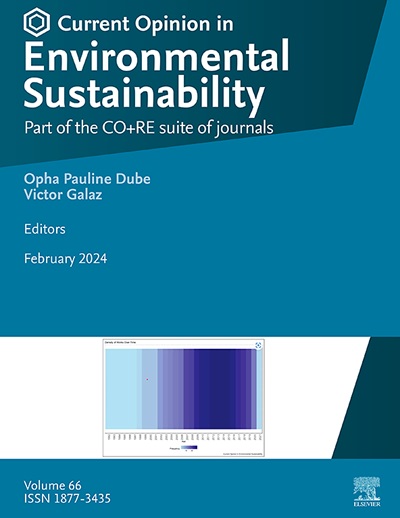Relational follow-up and review of the 2030 Agenda: accelerating the implementation of the sustainable development goals
IF 6.3
2区 环境科学与生态学
Q1 ENVIRONMENTAL SCIENCES
Current Opinion in Environmental Sustainability
Pub Date : 2025-08-26
DOI:10.1016/j.cosust.2025.101558
引用次数: 0
Abstract
Achieving the 2030 Agenda requires comprehensive follow-up and review across all levels of government. Although local governments play a critical role in implementing the sustainable development goals (SDGs), their current follow-up and review architecture — conceived from a global perspective and tailored to national reporting — ignores local actors. Understanding follow-up and review as a relational process, grounded in dynamic interactions across levels, can help ensure that no place is left behind. Advancing such a system involves three key shifts: repositioning follow-up and review as a strategic governance tool, aligning global goals with local priorities, and developing context-specific indicators. Drawing on emerging local practices, we show how relational approaches bridge the gap between global ambitions and on-the-ground realities by fostering adaptive policymaking, embedding the SDGs into strategic planning, and enabling context-sensitive implementation. This approach supports a more inclusive architecture for sustainable development, rooted in the strengths and agency of local actors.
《2030年议程》的相关后续行动和审查:加快落实可持续发展目标
实现《2030年议程》需要各级政府进行全面的后续行动和审查。虽然地方政府在实施可持续发展目标方面发挥着关键作用,但其目前的后续行动和审查架构——从全球角度构想并为国家报告量身定制——忽视了地方行为体。将后续行动和审查理解为一个相互关联的过程,建立在各级动态互动的基础上,可以帮助确保不落下任何地方。推进这一体系涉及三个关键转变:将后续行动和审查重新定位为战略治理工具,使全球目标与地方优先事项保持一致,以及制定具体情况的指标。根据新兴的地方实践,我们展示了关系型方法如何通过促进适应性政策制定、将可持续发展目标纳入战略规划以及实现对具体情况敏感的实施,弥合全球目标与实际情况之间的差距。这一方针支持建立一个更具包容性的可持续发展架构,以地方行动者的力量和能动性为基础。
本文章由计算机程序翻译,如有差异,请以英文原文为准。
求助全文
约1分钟内获得全文
求助全文
来源期刊

Current Opinion in Environmental Sustainability
ENVIRONMENTAL SCIENCES-ENVIRONMENTAL SCIENCES
CiteScore
13.80
自引率
2.80%
发文量
52
审稿时长
6-12 weeks
期刊介绍:
"Current Opinion in Environmental Sustainability (COSUST)" is a distinguished journal within Elsevier's esteemed scientific publishing portfolio, known for its dedication to high-quality, reproducible research. Launched in 2010, COSUST is a part of the Current Opinion and Research (CO+RE) suite, which is recognized for its editorial excellence and global impact. The journal specializes in peer-reviewed, concise, and timely short reviews that provide a synthesis of recent literature, emerging topics, innovations, and perspectives in the field of environmental sustainability.
 求助内容:
求助内容: 应助结果提醒方式:
应助结果提醒方式:


